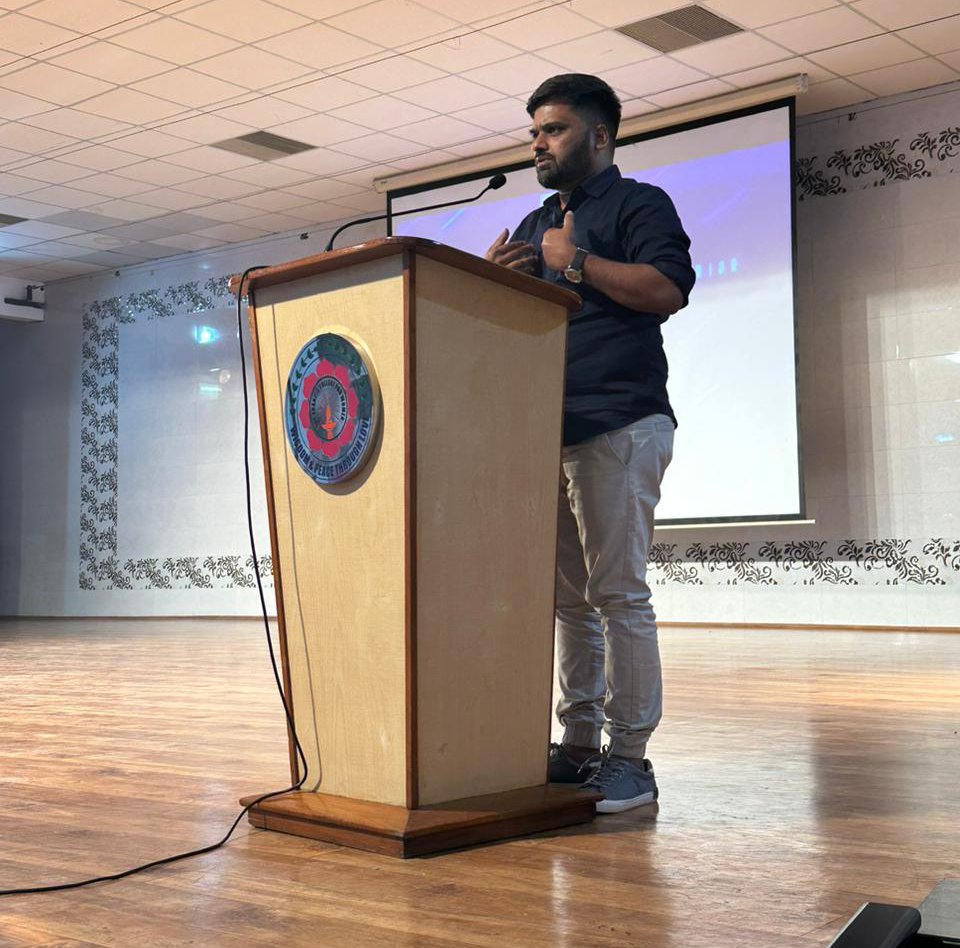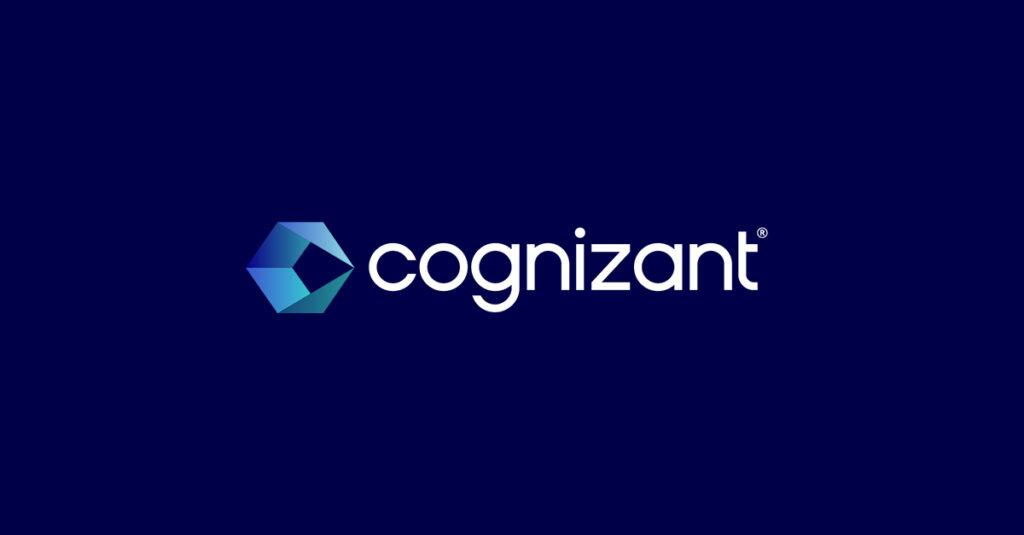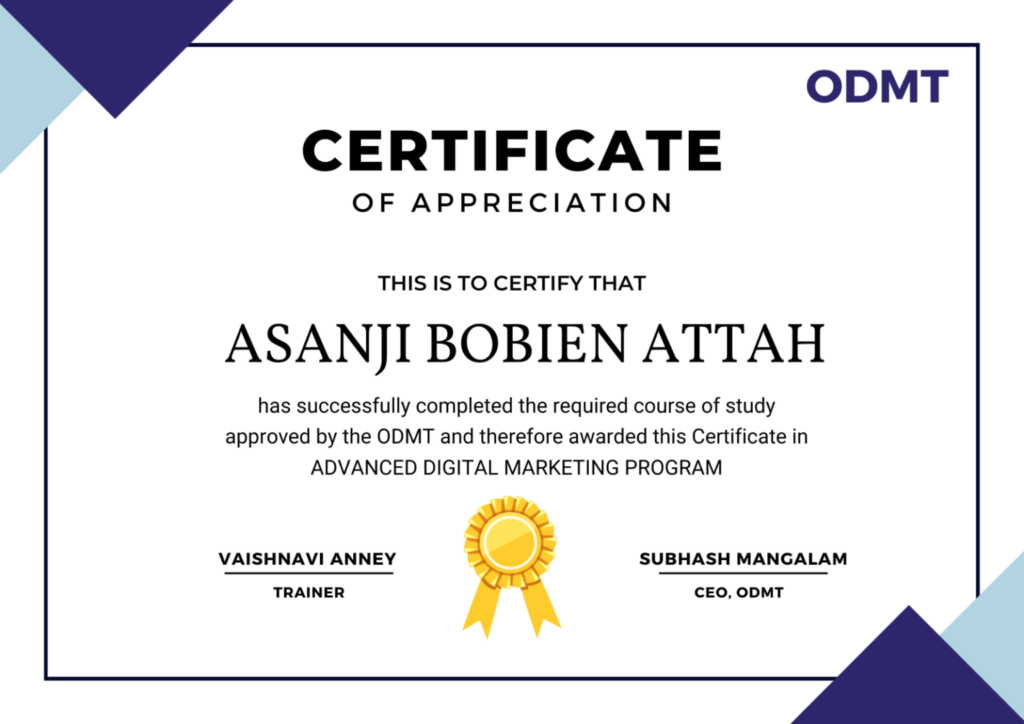Ask for FREE Demo Session + 100% Job Guarantee
Welcome to Advanced Digital Marketing Course in Telugu
#1 Institute for Providing Digital Marketing Course in Telugu. Get Trained by Industry Experts
Digital Marketing Course in Telugu
- Subject
- Tools
- Strategies
- Case Studies
- Live Project

Digital Marketing Course Syllabus 2024
Search Engine Optimization (SEO) is the process of optimizing a website to improve its visibility and ranking on search engine results pages (SERPs). Here is an overview of the topics Our SEO course will cover:
Introduction to SEO: The course start with an introduction to SEO, including its history, principles, and importance in digital marketing.
Keyword Research: Keyword research is a critical component of SEO. The course should cover how to identify and select appropriate keywords for your website and how to use them in your content.
On-Page Optimization: On-page optimization involves optimizing your website’s content, structure, and HTML code for search engines. We cover topics such as title tags, meta descriptions, header tags, and internal linking.
Off-Page Optimization: Off-page optimization refers to activities that improve your website’s visibility and authority outside of your website. The course should cover topics such as link building, social media marketing, and online reputation management.
Technical SEO: Technical SEO involves optimizing your website’s technical infrastructure, such as website speed, mobile optimization, and structured data. The course should cover technical topics such as website speed optimization, mobile optimization, and schema markup.
Analytics and Reporting: We cover how to measure and analyze the effectiveness of your SEO efforts using tools like Google Analytics and how to report your results to stakeholders.
SEO Tools: There are several SEO tools available that can help you optimize your website. We cover some of the most popular ones, such as SEMrush, Ahrefs, and Moz.
Google Ads is a digital advertising platform that allows businesses to create and display ads on Google’s search engine results pages (SERPs) and across Google’s network of websites and apps. A comprehensive Google Ads course should cover the following topics:
Introduction to Google Ads: The course should start with an overview of Google Ads, including its history, features, and benefits for businesses.
Keyword Research: Keyword research is essential for creating effective Google Ads campaigns. The course should cover how to identify and select appropriate keywords for your ads and how to use them in your ad copy.
Ad Formats: Google Ads offers several ad formats, including search ads, display ads, video ads, and shopping ads. The course should cover how to create and optimize each of these ad formats.
Ad Targeting: Targeting is critical for ensuring that your ads reach the right audience. The course should cover how to target your ads based on factors such as location, demographics, interests, and behaviors.
Bidding and Budgeting: Google Ads uses a bidding system to determine which ads are displayed on SERPs and other websites. The course should cover how to set your bids and budgets for your campaigns.
Ad Performance Measurement: The course should cover how to measure the performance of your ads using metrics such as click-through rate (CTR), cost per click (CPC), conversion rate, and return on ad spend (ROAS).
Optimization Techniques: The course should cover optimization techniques for improving the performance of your ads, such as A/B testing, ad rotation, ad scheduling, and ad extensions.
Google Ads Tools: There are several tools available within Google Ads that can help you optimize your campaigns. The course should cover some of the most popular ones, such as Google Ads Editor, Keyword Planner, and Google Analytics.
Social media marketing (SMM) is the practice of using social media platforms to promote a product, service, or brand. A comprehensive social media marketing course should cover the following topics:
Introduction to Social Media Marketing: The course should start with an overview of social media marketing, including its history, benefits, and best practices.
Social Media Platforms: There are several social media platforms available, and each has its unique features and benefits. The course should cover the most popular platforms, such as Facebook, Twitter, Instagram, LinkedIn, and YouTube, and how to create and optimize accounts on each platform.
Content Creation: Content is the heart of social media marketing, and the course should cover how to create compelling and engaging content for social media platforms, such as text posts, images, videos, and stories.
Social Media Advertising: Social media advertising allows businesses to reach a wider audience and promote their products or services through paid ads. The course should cover how to create and optimize ads on social media platforms, including targeting, bidding, and ad formats.
Social Media Analytics: Analytics are critical for measuring the effectiveness of social media marketing campaigns. The course should cover how to use analytics tools such as Facebook Insights, Twitter Analytics, and Google Analytics to track and analyze social media metrics such as engagement, reach, and conversions.
Influencer Marketing: Influencer marketing involves partnering with social media influencers to promote a product or service. The course should cover how to identify and work with influencers, and how to measure the effectiveness of influencer marketing campaigns.
Social Media Strategy and Planning: A successful social media marketing campaign requires a well-defined strategy and plan. The course should cover how to create a social media strategy, including setting goals, identifying target audiences, creating content calendars, and measuring success.
Social Media Management Tools: There are several social media management tools available that can help businesses manage their social media accounts and campaigns more efficiently. The course should cover some of the most popular tools, such as Hootsuite, Buffer, and Sprout Social.
Email marketing is the practice of using email to promote products or services and build relationships with customers or subscribers. A comprehensive email marketing course should cover the following topics:
Introduction to Email Marketing: The course should start with an overview of email marketing, including its history, benefits, and best practices.
Email Marketing Platforms: There are several email marketing platforms available, and each has its unique features and benefits. The course should cover the most popular platforms, such as Mailchimp, Constant Contact, and AWeber, and how to create and optimize email campaigns on each platform.
Email List Building: An email list is critical for email marketing success, and the course should cover how to build an email list, including how to create lead magnets, opt-in forms, and landing pages.
Email Design and Content: The course should cover how to create engaging and effective email designs, including how to write compelling subject lines, headlines, and body copy. The course should also cover how to optimize emails for mobile devices and how to use images and videos in emails.
Email Campaign Management: The course should cover how to manage email campaigns, including how to segment email lists, set up autoresponders, and A/B test emails.
Email Deliverability: Email deliverability refers to the ability of emails to land in subscribers’ inboxes. The course should cover how to optimize email deliverability, including how to avoid spam filters, use email authentication, and monitor email metrics.
Email Analytics: Analytics are critical for measuring the effectiveness of email marketing campaigns. The course should cover how to use email analytics tools, such as open rates, click-through rates, and conversion rates, to track and analyze email performance.
Email Marketing Strategy and Planning: A successful email marketing campaign requires a well-defined strategy and plan. The course should cover how to create an email marketing strategy, including setting goals, identifying target audiences, creating content calendars, and measuring success.
Google Analytics is a free web analytics service provided by Google that tracks and reports website traffic. A comprehensive Google Analytics course should cover the following topics:
Introduction to Google Analytics: The course should start with an overview of Google Analytics, including its history, benefits, and best practices.
Setting up Google Analytics: The course should cover how to set up Google Analytics on a website, including how to create an account, add tracking code, and configure account settings.
Navigating the Google Analytics Dashboard: The course should cover how to navigate the Google Analytics dashboard, including how to use the menu, view reports, and customize views.
Understanding Google Analytics Metrics: The course should cover the most important Google Analytics metrics, such as page views, bounce rate, session duration, and conversion rate.
Understanding Google Analytics Reports: The course should cover how to use Google Analytics reports, such as Audience, Acquisition, Behavior, and Conversions reports, to gain insights into website performance.
Advanced Google Analytics: The course should cover more advanced topics, such as how to set up goals and events, how to use custom dimensions and metrics, and how to track e-commerce transactions.
Google Analytics Integrations: The course should cover how to integrate Google Analytics with other tools, such as Google Ads, Google Search Console, and Google Tag Manager.
Google Analytics Strategy and Planning: A successful Google Analytics implementation requires a well-defined strategy and plan. The course should cover how to create a Google Analytics strategy, including setting goals, identifying key performance indicators, and measuring success.
Blogging, YouTube, and affiliate marketing are three related fields that can be taught together in a comprehensive digital marketing course. Here’s an overview of what should be covered in each of these topics:
- Blogging:
- Introduction to Blogging: The course should start with an introduction to blogging, including its history, benefits, and best practices.
- Setting up a Blog: The course should cover how to set up a blog, including choosing a domain name, selecting a hosting provider, and installing a content management system like WordPress.
- Blogging Strategy and Planning: A successful blog requires a well-defined strategy and plan. The course should cover how to create a blogging strategy, including identifying target audiences, creating content calendars, and measuring success.
- Content Creation: The course should cover how to create engaging and effective blog content, including how to write compelling headlines, use images and videos, and optimize posts for search engines.
- Blog Promotion: The course should cover how to promote blog content, including how to use social media, email marketing, and search engine optimization (SEO) to drive traffic to the blog.
- YouTube:
- Introduction to YouTube: The course should start with an introduction to YouTube, including its history, benefits, and best practices.
- Setting up a YouTube Channel: The course should cover how to set up a YouTube channel, including choosing a name, designing a channel art, and optimizing the channel for search engines.
- YouTube Content Strategy and Planning: A successful YouTube channel requires a well-defined strategy and plan. The course should cover how to create a YouTube content strategy, including identifying target audiences, creating content calendars, and measuring success.
- Video Creation: The course should cover how to create engaging and effective YouTube videos, including how to write scripts, use lighting and audio equipment, and edit videos.
- YouTube Promotion: The course should cover how to promote YouTube videos, including how to use social media, email marketing, and search engine optimization (SEO) to drive views to the videos.
- Affiliate Marketing:
- Introduction to Affiliate Marketing: The course should start with an introduction to affiliate marketing, including its history, benefits, and best practices.
- Affiliate Marketing Networks: The course should cover how to join affiliate marketing networks, such as Amazon Associates, ClickBank, and ShareASale.
- Finding Affiliate Products to Promote: The course should cover how to find affiliate products to promote, including how to choose products that match your audience’s interests and needs.
- Affiliate Marketing Strategy and Planning: A successful affiliate marketing campaign requires a well-defined strategy and plan. The course should cover how to create an affiliate marketing strategy, including setting goals, identifying target audiences, and measuring success.
- Promoting Affiliate Products: The course should cover how to promote affiliate products, including how to use blogging, YouTube, and social media to drive sales. The course should also cover how to use email marketing and paid advertising to promote affiliate products.
So learn How to create Instagram ads 🙂
Job Roles
Digital Marketing Manager, SEM Manager, SEO Specialist, Social Media Executive, Analytics Manager, PPC Specialist, and Digital Marketing Executive.
Who Can Learn?
Students, Working Professionals, and Entrepreneurs. People who are looking for Freelancing and work from home can also join the program.
Eligibility
Bachelor or Equivalent Degree. Students who are pursuing their degrees also can Join the program. the percentage is not a matter. You should have good knowledge of social media.
Suitable for the Students
Who Can't Afford Fee-
WordPress
-
SEO
-
Google Ads
-
Social Media
-
FB Ads
-
Email Marketing
-
Google Analytics
-
No Support on Jobs
Suitable for Jobs
Fresh Graduates Can go for This-
Website Designing
-
SEO
-
Google Ads
-
Social Media Marketing ( Limited)
-
Google Analytics
-
Mock Interview
-
Live Projects
-
Job Asistance
Suitable for Jobs
Freelancing & Make Money Online-
Every thing in 45 Days Plan
-
Advanced SEO
-
Ads Real Time Budget
-
Email Marketing
-
Blogging, YouTube & Affiliate Marketing
-
Freelancing
-
AI Tools
-
100% Job Guarantee
Doubts?
Talk to Our
Program Advisor
Book a Free Demo Today!
Please fill the form below and we will get in touch with you.
డిజిటల్ మార్కెటింగ్ కోర్స్ తెలుగు లో - Call +91-994-919-7070
Learn the Course With Live Projects of Our Clients



Digital Marketing Course in Telugu – మా యొక్క గోల్ 2024 లో 10,000 స్టూడెంట్స్ కి జాబ్ Placement ఇప్పియ్యడం . జాయిన్ అయ్యిన ప్రతి ఒక్క స్టూడెంట్ కి జాబ్ ఇప్పిస్తాము . కోర్స్ లో భాగంగా లైవ్ ప్రాజెక్ట్స్ , క్లైంట్స్ ప్రాజెక్ట్స్ పైన వర్క్ చెయ్యడం ఉంటుంది . ప్రతీ రోజు tasks ఇవ్వబడును . Next Day , Trainers మీ టాస్క్ చెక్ చేశాకే క్లాస్ స్టార్ట్ చేస్తారు . ODMT లో డిజిటల్ మార్కెటింగ్ కోర్స్ చేసిన ప్రతీ స్టూడెంట్ కోర్స్ అయిపోయే లోపు ఒక క్లయింట్ ని మైంటైన్ చేసే స్టేజి లో ఉంటాడు . Jobs మాత్రమే కాకుండా స్టూడెంట్స్ ని సొంత బిజినెస్ చేసుకోవడానికి , Freelancing చేసుకోవడానికి మరియు Make Money Online చేసుకోవడానికి వీలుగా తయారు చేస్తాము . So, Learn Digital Marketing Course in Telugu. మీరు first ఒక ఫ్రీ డెమో అటెండ్ కండి . అందులో మీ సందేహాలు అన్నీకూడా clarify అవుతాయి . Call us on +91-994-919-7070
Certificates
Digital Marketing Certificate from ODMT for qualified Students. As we maintain quality Our certificates really matter. 5 Google Certificates and 1 Hubspot Certificate
Projects
Capstone projects from 5 domains and 25+ hands-on course end projects. Students will submit the end Project. Every thing you will work on Live client projects
Placement
ODMT helps you get noticed by top hiring companies. Almost every industry needs Digital Marketers Now. 100% Job Guarantee Program. Salary Depends on Student.
Get Mentorship By Subhash Mangalam
Subhash Mangalam, who worked with India’s Biggest Edtech Companies in the Field of Digital Marketing. He is going to guide you in your career. Mr. Subhash Mangalam has transformed many students’ careers. Now We are providing Digital Marketing Course in Telugu Language to help students who are comfortable with Telugu Language. Why are you waiting? Just click the button below.

ODMT Telugu – Media Coverage

Krishna Priya


Harisha

Meet Our Trainers
ODMT Trainers have vast experience on real time Digital Marketing Projects. They worked with USA and Uk Projects. Their approach is more practical than theory. We started with English, but due to demand in telugu Now Digital Marketing Course in available in Telugu.
ODMT Alumni Work At




ODMT Telugu – Free Resources





Sample of Certificates


Digital Marketing Course in Telugu - 100% Job Guarantee
Why Should I Join ODMT Digital Marketing Course?
Enrolling in the ODMT digital marketing course provides numerous significant benefits and a life-changing educational experience. As a result, our alumni have achieved remarkable career success. Our Students are Doing Jobs, Freelancing and a few of them started a Digital Marketing Agency. First, our Digital Marketing curriculum is carefully designed to make sure it includes the most recent trends in digital marketing. Second, we give more importance to practical learning by giving access to Our real-world Client projects to help you get ready for industry expectations.
Moreover, our digital marketing course offers hands-on experience. In addition to the course, we are teaching communication skills to Telugu students. Therefore Students are going for Interviews with more confidence. On top of that We are Teaching New AI tools so that students can do their tasks faster while working. 100% Job and Lifetime Support to Our Students Makes us special in the market.
Frequently Asked Questions
100% Job Guarantee. We will refund money, if you don’t get Job.
According to a report by Digital Vidya, the average salary for a digital marketing professional in India in 2021 was around Rs. 5-6 lakhs per annum. However, salaries can vary depending on several factors such as years of experience, job role, location, and industry.
Here’s a breakdown of average salaries for some common digital marketing job roles in India, as reported by Naukri.com in 2021:
- Digital Marketing Manager: Rs. 9-10 lakhs per annum
- SEO Manager: Rs. 6-7 lakhs per annum
- PPC/SEM Manager: Rs. 6-7 lakhs per annum
- Social Media Manager: Rs. 4-5 lakhs per annum
- Content Marketing Manager: Rs. 6-7 lakhs per annum
It’s worth noting that salaries in the digital marketing industry are highly influenced by experience and skills. Therefore, professionals with more experience and advanced skills can earn significantly higher salaries than the average. Additionally, location and industry can also play a significant role in determining salary levels.
Overall, the digital marketing industry in India is growing rapidly, and skilled professionals are in high demand. With the right skills and experience, digital marketing professionals can earn competitive salaries and build successful careers in the industry.
Yes, it is possible to switch your career to digital marketing from other industries. In fact, many professionals from diverse backgrounds are now transitioning to digital marketing because of its growing demand and high potential for career growth.
To switch to digital marketing, you may need to acquire new skills and knowledge related to the field. One of the best ways to do this is by taking a digital marketing course or certification program. This will help you learn the core concepts and techniques of digital marketing, such as SEO, social media marketing, email marketing, content marketing, and more.
You can also start by gaining practical experience in digital marketing by volunteering for projects or internships in the field. This will give you the opportunity to work with real clients and apply the skills you have learned in a professional setting. Another way to make the transition is by leveraging your existing skills and experience to specialize in a specific area of digital marketing. For example, if you have a background in graphic design, you could focus on developing your skills in visual content creation for digital marketing campaigns.
Overall, switching to a career in digital marketing requires dedication, willingness to learn new skills, and persistence. However, with the right approach and preparation, it is possible to make a successful transition to a career in digital marketing.
Yes, there are many freelancing opportunities available in digital marketing. As the demand for digital marketing services continues to grow, many businesses and organizations are looking for skilled freelancers to help them with their digital marketing campaigns.
Here are some of the popular freelancing opportunities in digital marketing:
Search Engine Optimization (SEO) – Many businesses are looking for SEO freelancers to help them improve their website rankings in search engine results pages.
Social Media Marketing – Freelancers with expertise in social media marketing can help businesses create and manage their social media profiles, develop social media strategies, and create social media content.
Pay-Per-Click (PPC) Advertising – Freelancers with experience in PPC advertising can help businesses create and manage their PPC campaigns on platforms like Google Ads and Facebook Ads.
Content Marketing – Freelancers with skills in content creation, copywriting, and content strategy can help businesses develop and implement effective content marketing campaigns.
Email Marketing – Freelancers with expertise in email marketing can help businesses develop email marketing strategies, create email templates, and manage email campaigns.
To find freelancing opportunities in digital marketing, you can use online platforms like Upwork, Freelancer, Fiverr, or LinkedIn. You can also reach out to local businesses in your area to offer your services.
Overall, freelancing in digital marketing can be a great way to earn a flexible income while developing your skills and building a portfolio of work.
Yes, there are many work from home job opportunities available in digital marketing. In fact, many digital marketing jobs can be done remotely, allowing you to work from the comfort of your home or anywhere with an internet connection.
Here are some of the common work from home job opportunities in digital marketing:
Digital Marketing Manager – A digital marketing manager is responsible for developing and implementing digital marketing strategies for businesses. This job can be done remotely, and many companies are now offering remote positions for this role.
Social Media Manager – A social media manager is responsible for managing a company’s social media profiles, creating social media content, and developing social media strategies. This job can also be done remotely.
Content Writer – A content writer is responsible for creating written content for digital marketing campaigns, such as blog posts, articles, social media posts, and email newsletters. Many content writers work remotely for digital marketing agencies or businesses.
Search Engine Optimization (SEO) Specialist – An SEO specialist is responsible for improving a company’s website ranking in search engine results pages. This job can be done remotely, and many SEO specialists work as freelancers or remote employees for digital marketing agencies.
Pay-Per-Click (PPC) Specialist – A PPC specialist is responsible for managing a company’s PPC campaigns on platforms like Google Ads and Facebook Ads. This job can also be done remotely.
To find work from home job opportunities in digital marketing, you can search for remote job listings on job boards like Indeed, LinkedIn, and Glassdoor. You can also reach out to digital marketing agencies and businesses to inquire about remote job opportunities.
Overall, working from home in digital marketing can be a great way to enjoy a flexible work schedule while pursuing a fulfilling career in a fast-growing industry.
Yes, absolutely! One of the primary objectives of a digital marketing course is to equip you with the skills and knowledge necessary to promote your own business effectively online.
By taking a digital marketing course, you will learn various techniques and strategies for promoting your business online, such as search engine optimization (SEO), social media marketing, email marketing, content marketing, and more.
You will learn how to create effective marketing campaigns, how to analyze website traffic and user behavior, and how to track the performance of your marketing efforts. With this knowledge, you will be able to develop a comprehensive digital marketing strategy that can help you reach your target audience and grow your business online.
In addition to learning these skills, a digital marketing course can also give you the confidence and motivation to promote your business more effectively. You will gain insights into industry best practices, learn from case studies, and receive feedback from experienced instructors, all of which can help you improve your marketing efforts and achieve better results.
Overall, a digital marketing course can be a valuable investment for any business owner who wants to promote their business online more effectively. With the right skills and knowledge, you can create a strong online presence and attract more customers to your business.
Digital Marketing Classes Available in Telugu, English and Hindi.
As of Now We are Providing Digital Marketing Course 4 Months. 3 Months Course and 1 Month Internship.
Digital Marketing Salaries for freshers in Hyderabad is 10,000 to 25,000 per month. It purely depends on student subject knowledge. Once you get Experience Salaries will be great.
Obviously ODMT is the Best Digital Marketing Course provider in Hyderabad. You Can visit ODMT Telugu Youtube channel and see the success stories of Our Students.
Obviously Yes. As online usage is growing, demand for Digital Marketers also Growing. Digital Marketer Can do Job, Freelancing, Start a business, make money online and can start an agency. Due to its flexibility Digital Marketing is a great career.
Qualification is not a matter for Digital Marketing. Companies will see Your skill rather than your certificates. Any degree is fine. But I have placed many students who failed in Degree too.
Yes, Happily. But make sure that you take this career as serious. Improve your knowledge, then not having a degree will not hurt you.
As Compare to Software Job, Getting placed in Digital Marketing is easy. because it doesn’t require coding and easy to learn the subject. One more Important thing is Subject is very much Interesting so students put lot of efforts
Yes. We have trained many Career Gap Students and they placed Successfully. Happily, You can Join.
70% of Our Students are Housewives. We placed many housewives in Work from Home Jobs. As Compared to Work from Office, work from Home Jobs are less. It may take time, But You will get it.
